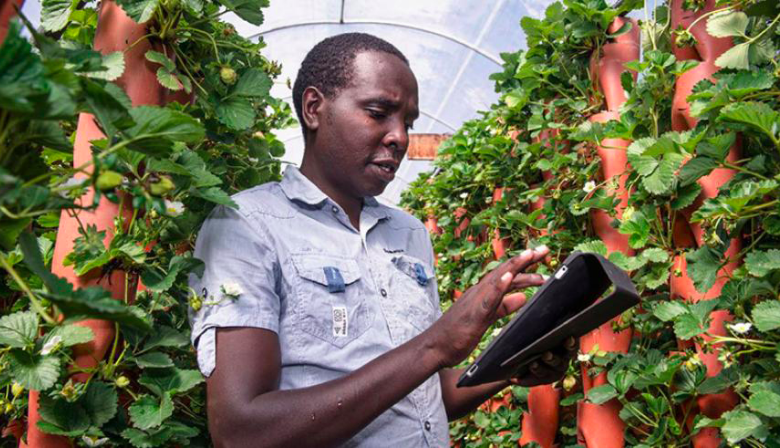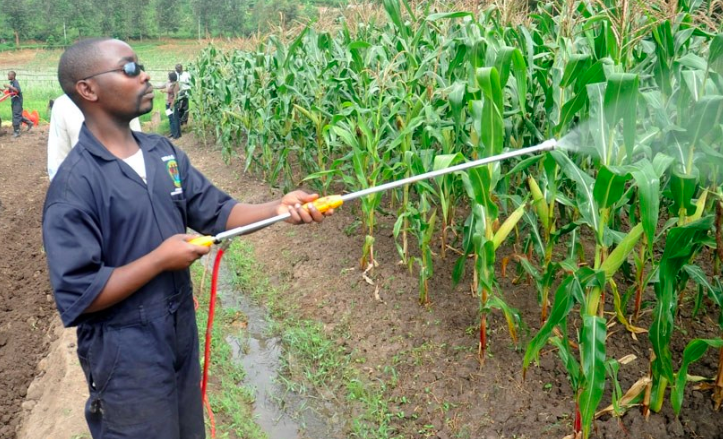Agriculture and agribusiness are projected to become a trillion-dollar industry in Africa by 2030. Dr. Martin Fregene, Director of Agriculture and Agro-Industry at the African Development Bank, outlines the opportunities this presents for Africa’s youth.
At 23 years old, Aboubacar Karim is CEO and founder of INVESTIV, an Ivorian startup established in 2017 specialized in precision agriculture.
INVESTIV uses drones to provide farmers with information on soil quality, plant health conditions, spraying crops with pesticides and fertiliser, and measurement and monitoring of crop development through an online platform.
The company has mapped and monitored over 8,000 hectares of land and created more than 20 jobs.
Bright young Africans like Karim are the reason why the African Development Bank is investing millions of dollars in Africa’s agriculture sector – with a focus on youth.

Karim won the Bank’s 2018 African Youth Agripreneur Forum and AgriPitch Competition – an annual event instilling a culture of innovation and nurturing technology-led agribusiness innovations to create jobs and improve livelihoods among youth.
In addition, the Bank is working with its member countries and other development partners through implementation of the Enable Youth Program, one of the Bank’s flagship initiatives addressing Africa’s youth employment challenges.
Enable Youth empowers young men and women at each stage of the agribusiness value chain as agripreneurs. To date, the Bank has committed over $350m to Enable Youth investments in 12 countries on the continent.
The goal of the Bank’s Jobs for Youth in Africa Strategy is to create 25m jobs by 2025.
Of the various economic sectors that can engage youth, the agribusiness sector is best placed to provide significant employment and economic opportunities.
Despite rural urban migration, about 70% of youth in Africa still reside in rural areas and most work in the agriculture sector where they account for 65% of the workforce.
In addition, the agriculture and agribusiness sectors are projected to become a one trillion-dollar industry in sub-Saharan Africa by 2030.
According to the FAO, the food import bill for sub-Saharan Africa in 2017 was $47bn – a clear market opportunity. There is phenomenal growth in global and regional agri-food markets and agro-based industries in Africa – responding to this demand can provide jobs and income to youth.
Africa’s youth must be ready to take advantage of these fast-growing agricultural markets. The Bank is committed to empowering a new generation of young commercial farmers who will make African agriculture more productive, more efficient and more competitive.

Kenyan agripreneur Yvonne Otieno is part of this new generation. The CEO and co-founder of Miyonga Fresh Greens, which focuses on improving small holder fruit and vegetable farmer access to global markets, participated in a Bank-organised SME training in Korea that exposed her to new innovative technologies. Miyonga Fresh Greens started as a 1.5 acre family farm growing French beans and baby corn, and has since grown to 10 acres, exporting directly to Europe. It has expanded from two product lines to six product lines and from trading just in raw agricultural products like fresh vegetables and fruits to value addition products including dried fruits and fruit powder for export.
The company now works with a network of 5,000 small-holder farmers who have over 200 hectares of land and has created employment for 100 women and youth. It is currently in discussions with a distributor who has over 1,000 retail outlets across Europe as well as a strong online presence.
There are clear opportunities for drawing youth to the agriculture sector as agripreneurs. With the right entrepreneurship ecosystem, skills, technologies and improved access to finance, young African men and women will approach agriculture as a business and can become the proud owners of viable and profitable agribusiness enterprises.
The result of investing in youth will be more jobs created, increased food production for a growing population, less reliance on food imports and a healthier trade balance for African countries.
The Bank is committed to working with Africa’s private and public sector actors to enable Africa’s youth to lead and succeed in agricultural sectors not just across the continent, but also around the world.
The African Development Bank is hosting the third edition of the African Youth Agripreneur Forum and AgriPitch Competition from 24-28 June in Cape Town.
Source: African Business Magazine

